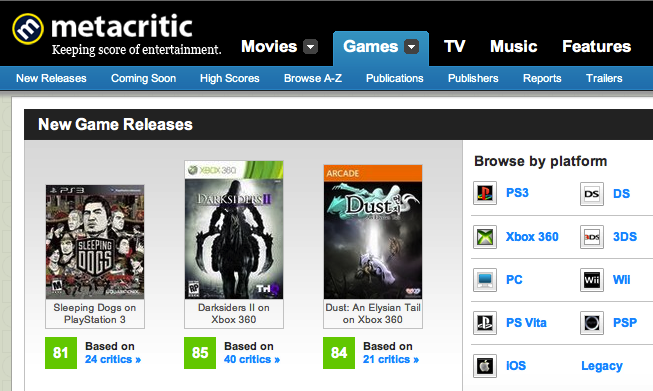
With the recent job offer from Irrational games asking for a developer who has worked on a title that scored 85+ on Metacritic (an arbitrary number for sure, but no more than asking six years of experience instead of four or five), the copy/paste machine that we call the Internet is in full rage mode again against those practices. Typically, two parties are blamed: either the evil developers and publishers who put that much emphasis on the Metascore, or Metacritic itself.
[aditude-amp id="flyingcarpet" targeting='{"env":"staging","page_type":"article","post_id":694319,"post_type":"story","post_chan":"none","tags":null,"ai":false,"category":"none","all_categories":"games,","session":"A"}']And while everyone loves to complain about how Metascores are arbitrarily defined aggregates of arbitrarily chosen reviews with an arbitrary (and secret) weighting, the most guilty party of all, the one without which all of this could not happen, is silently left behind: the review scores given by so-called "professional" reviewers that are at the basis of the aggregation. Review scores are at the heart of our gaming culture and they need to go.
Big outlets like IGN and GamesRadar have recently attacked Metacritic for "destroying the industry.” Of course, one must not forget that those website have what we may call a slight conflict of interest in this debate. Metacritic is a big threat to the major gaming sites that used to rule the world. These sites used to get all the traffic from people wanting to quickly find out wether or not a game is "da bomb" or "sucks ass.” Before Metacritic, regular people who don't have hours to spend on making a game purchase decision would go to IGN, see an eight and say, "Oh, shit. This looks lame.” Now they see an 81 on Metacritic, with Gamerzine Russia giving a 100 and Edge Magazine the usual 20. What's worse, really ? The arbitrary aggregation or the arbitrary scores? Would we rather go back to a time where only a handful of outlets controlled the fate of our games?
The practice of giving a numbered score at the end of reviews is the real problem here. Putting a number on a game at the end of a review is meaningless and should never be done. Why is that ? Let me give you a few reasons:
1. A $15 game may or may not be scored the same as a $60 game, but the more expensive one is not re-scored when its price drops.
2. A game that ships with countless bugs (hello, Fallout: New Vegas) may lose an arbitrary number of points over the problems it has, even though a day one patch might correct it and regular players like you and I will never notice it.
3. You never know when a game is reviewed by a total fanboy or a hater of either the developer, the platform (for exclusives), the genre, or the series. Reading the review might help you understand if a title will be to your taste or not, but certainly not the score.
4. You never know how much of a game the reviewer has actually played.
5. A game on multiple platforms will typically only be scored for the one it performs best on.
[aditude-amp id="medium1" targeting='{"env":"staging","page_type":"article","post_id":694319,"post_type":"story","post_chan":"none","tags":null,"ai":false,"category":"none","all_categories":"games,","session":"A"}']
6. Remakes generally have over-inflated scores so as not to go against the score given 10 years ago by the same outlet with very different criteria.
11. A game with average graphics on a high-end console will lose points over a game with horrible graphics on a low-end console (hello, Xenoblade), thus encouraging developers to do the later more often.
And the list goes on and on.
If IGN and GamesRadar are serious about their attack on Metacritic (and not just harassing a competitor), they should eliminate the base of the problem: numerical review scores. This obsession with numbers is the real issue faced by the industry, not the fact that a third party happens to aggregate them.
